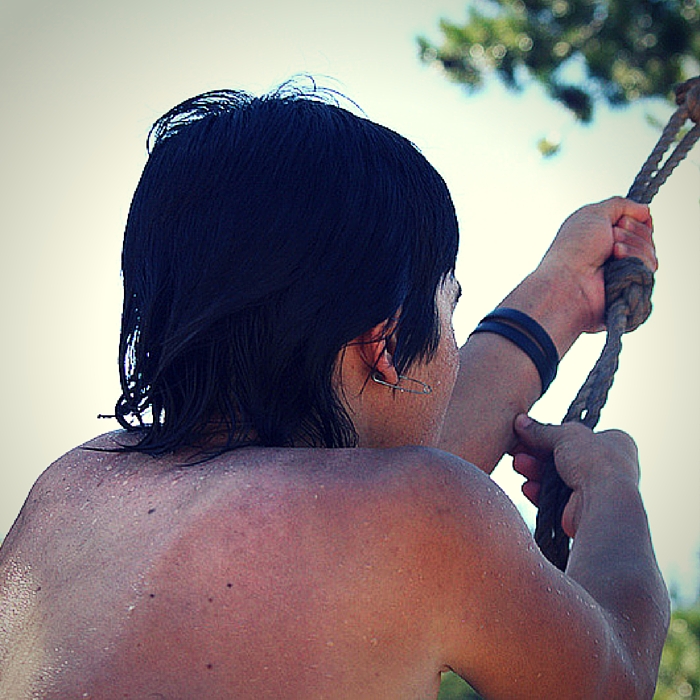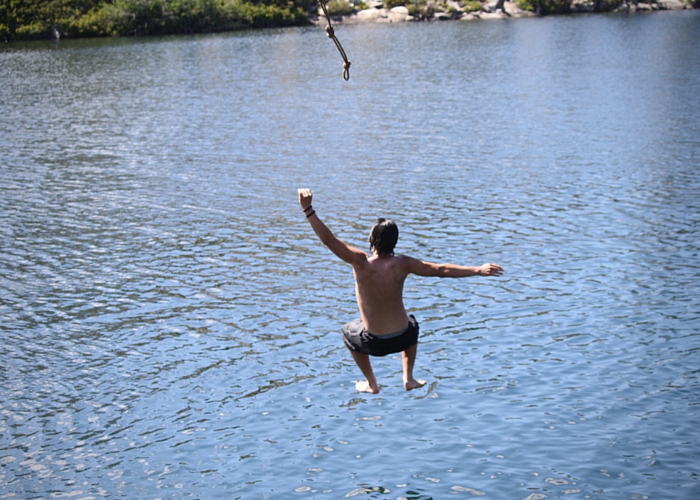Value experimentation AKA Risk
Risk.
Experiment.
Explore.
Such tame words compared to their shadows:
Catastrophe, failure, lost.
I went kayaking recently with good friends. The husband of one of my running partners decided to climb a tree (up the small wood planks nailed to the tree as a kind of ladder) with a rope swing in hand so that he could then launch his body over a river (6 foot depth) and create a big splash. This man is 63 years old.
Needless to say, the five of us on the water watching the scene unfold were double checking our insurance cards, the bars on our cell phones, and how to travel back to the dock quickly, if needed.
Jeff jumped and swung his body across the muddy water, and then let go! Splash! In he went. Fine. No injuries. No mistakes. Sheer joy.
The highlight of our trip that day!
All of us marveled at how uptight we were compared with Jeff. He trusted his body. He took a risk the rest of us deemed unwise. No one stopped him, not even his wife. We all benefited.
I think about our kids who risk, experiment, and explore—all while we hand wring and worry. When the choices they make work out, we sigh relieved, and brag to friends. When their choices fail, we double down in our minds thinking, “Never doing that again!”
So much energy wasted on worry—when all of life is risk. In that same location, next to the muddy river, is a bike trail. One of the kayakers (another running partner) had slipped and fallen on a flat path, firmly attached to the ground, years before while we were out for a run. She fell into a branch on the bike path, bruising her chest, requiring a trip to the ER. We weren’t taking undue risks, yet still saw injury.
Every day I read homeschool discussion that is saturated in worry—the ever-present attempt to control outcomes, as though we can, as though we are able to shape our children into the people we expect them to become.
We ferret out risk. We compare our anxieties to our children’s activities.
What if we flipped the script? What if we gave up our fantasies of failure? What if we fantasized about success through unconventional means? What if we trusted a little more—that this child has an innate curiosity, sense of self, and power to find out what he or she needs to know?
What if our child is an outlier, after all? Someone whose education comes through unconventional means?
I remember the day Noah said to me, “Mom, you raised me in an unconventional way. Now you want me to become a conventional person?”
It was a moment.
There are days where I have to sit myself down, feet hanging from my knees, and let them swing easily back and forth, remembering that in the scheme of things, I have little control over outcomes.
My best posture is “porch swing.”
I can watch, wait, whistle, and wonder. There’s my child doing X. There’s my child, still doing X. Wow, look at my child doing X! How amazing it is, all that my child has learned doing X.
The big splash comes after time spent:
- imagining,
- practicing,
- testing,
- “over-indulging,”
- risking,
- experimenting,
- exploring,
- and letting go.
You may not feel brave enough to let go of everything, but maybe today or this week you can step back from one place that flips your switch.
Back up.
Get on the porch swing.
Dangle your feet.
And watch.
Image by Wheeler Cowperthwaite (cc cropped, tinted)





















